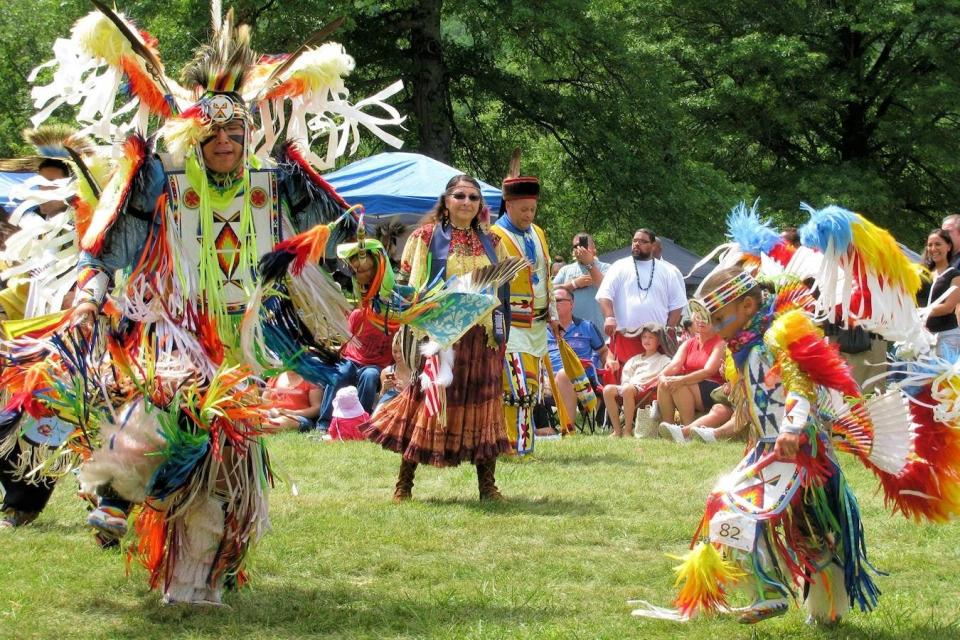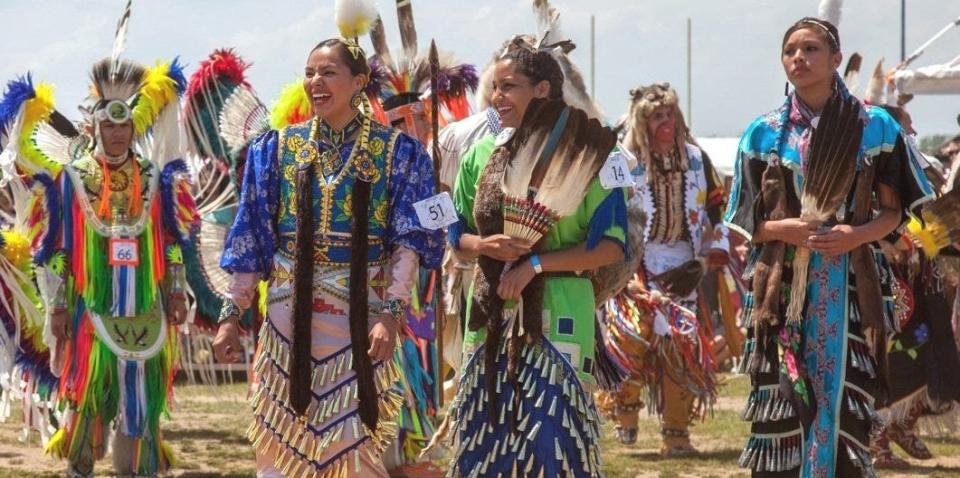Ramapo Munsee Nation remains one of the only Indigenous tribes federally unrecognized
- Oops!Something went wrong.Please try again later.
Since the 1930s, Americans have observed the second Monday in October to honor a man who, for centuries, was believed to have discovered the land we live in. But in recent years, one group of people has been making their voices heard -- and attempting to change the narrative.
New York state has a long history with indigenous populations. The Iroquois and Algonquin nations inhabited most of the Northeast North American coast before Puritan English settlers arrived in the 1600s. Many towns, roads and landmarks in the Lower Hudson Valley have indigenous names and deep ties to the tribes who called the land home. In Westchester and Rockland, the Lenape people were the main inhabitants. The Lenape had several tribes within its nation, including the Lenni Lenape, the Delaware Lenape and the Ramapo Munsee Lenape.
Learning about the tribes native to New York land was required education for many, but just as many don't know that the Lenape are still living and thriving in the area.
Clifton Matias is a member of the Kichwa and Taino tribes and lives in New York City. He's also co-founder and cultural director of the Redhawk Native American Arts Council, an organization that brings together indigenous artists from the tri-state area and organizes programs and events "educating the public about who indigenous people are today through song, music and works of art."

"There's individual tribes of people [here] but Indigenous people in the United States or in the New York area live pretty much like everyone else," Matias said. "They just celebrate these parts of our culture."
He said he works with existing tribes like the Ramapo Lenape Munsee Nation in northern New Jersey, the Shinnecocks in Long Island, the Schaghticoke Nation in Kent, Connecticut, and the Nanticoke Nation in Southern New Jersey to organize powwows and strengthen the presence of the indigenous community in New York and New Jersey.
"Essentially, as hard as it may be to believe and as much as it's been kept secret, without my ancestors, there literally would not be a New Jersey, a New York or a United States of America. Now that's a big mouthful and I'm ascribing that feat only to the Ramapos," Chief Dwaine Perry said.
Perry's been the leader of the Ramapo Munsee Nation in Mahwah, New Jersey, since 2007. It is one of few indigenous tribes in the tri-state area, and one of the only remaining tribes that are federally unrecognized. He said the erasure of his people from the narrative of the country is purposeful.
"In the beginning, George Washington and the rebels, who had like values that we had, they believed in equality and all that, realized the only way they could possibly win the American Revolution was by having complete control over the Ramapo Pass, because it was the back door to the New England colonies." Perry said. Without the use of the Ramapo Pass, located near Hillburn, New Jersey, Perry said the only way that the British could viably reinforce and supply their troops was off the Atlantic or march them down through Canada.
Perry said that the Ramapo Lenape iron deposits were also used as important materials like the first cannonballs fired in the American Revolution, the fabled chain across the Hudson, and even the Capitol Dome and the Lady of Freedom above the dome.
But the Ramapo Munsee have all but been erased from history books.
"The very first thing that George Washington did after securing the American Revolution was betray the Ramapos and try to enslave us, which made the Ramapos the first people to be enslaved in the United States," Perry said. "To support that, Harriet Tubman had said at one point, the most dangerous slave county in the country was Bergen County."
It's hard to exist as a tribe in the tri-state area, Perry said, because property costs are so high and everyone is fighting over the land.
"Lenape are the people who left their homelands en masse when the Europeans came," Perry said. "We're Munsees. We're the people who stayed. We are the resistors. We didn't go any place and we're suffering for that. I'm imagining if we went to another state, we'd already have federal recognition but because we stayed, we have suffered for that and we're suffering right now for that."
According to Perry, the Ramapo Munsee have been fighting the long game of getting federally recognized, but some local and federal politicians successfully got their petitions blocked.
"I'm thinking at this stage of the game, because we can substantiate what I just said. Should we be looking for recognition or should we be looking for an apology?" Perry said. "So we've basically gone from thousands and thousands of people down to a couple thousand to the edge of quiet genocide."
Perry said he believes that if his people did not resist assimilation as strongly as they did, he "[doesn't believe anybody would be going to Africa to look for slaves."
"Yes, I do think this federal government and most of America owes us an apology," Perry said.
Since the 1990s, indigenous communities have pushed back on the narrative that Christopher Columbus discovered North America in 1492, after the king and queen of Spain sent him on his legendary voyage to find India. While it may be true that he landed in San Salvador, El Salvador that year and encountered an unfamiliar population living there, Indigenous people say there's no way he discovered America if they were there first.

"You know, all of this resonates with native people as the coming together and combating, because it's all part of that indigenous erasure," Matias said. "Where you're erasing indigenous people from the history of this country. You can start that by acknowledging Columbus and acknowledging that he discovered America. If you acknowledge that, then there's no way that you're supporting indigenous people and their history here. Native people have been here for thousands and thousands of years and the simple fact that we're celebrating someone for discovering them [is wrong.]"
He said the movement has not only spread through the United States, but it has also gone worldwide to areas that have been colonized and celebrate the false discoveries of a new world, including in Australia and the Caribbean. However, Matias said the impact is greater in the United States because of the federal holiday and the celebration and purposeful push for the narrative that Columbus discovered North America in history books.
The reason for the federal holiday actually comes from an early immigrant population in New York City. According to the Encyclopedia Brittanica, Columbus Day was first celebrated in the 1790s by the Columbian Order of New York, better known as Tammany Hall, the political machine that bankrupted the city during the Gilded Age.
As Italian immigrants were arriving to Ellis Island, New York City residents were becoming increasingly hateful. A Columbus Day statement from the White House in 2022 said that President Benjamin Harrison first encouraged the celebration of the day in 1892 after 11 Italian-Americans were lynched in New Orleans the year before.
By the 1930s, Italian-Americans were one of the highest growing populations in New York City. They began to idolize Columbus because of his Italian heritage and made him a national hero. In 1934, the Knights of Columbus and other Italian-American leaders in New York City helped pass an acknowledgement of Columbus's October 12 birthday as a national holiday in Congress.
But the act of honoring one man turned into the erasure of an entire population who were exposed to severe illness, mass murder and forced migration.
"I mean, you think about it, the Spaniards, who were no humanitarians at all, sent Columbus back in chains," Matias said. "He spent a year in prison for the crimes that he committed in the Americas. So, even the Spainards recognized that he was a criminal."
As for Chief Perry, he said he understands what it's like to be persecuted and feels that Columbus Day should still be celebrated, if only as a recognition of Italian Americans.
"In a way, I feel kind of sorry," he said. "I sat down about two years ago with somebody that was head of the Knights of Columbus in New York City. I think they were looking for an argument and my whole thing was, no. There are so many valiant and beautiful and globally essential people through the Renaissance. I wouldn't take nothing down, I would just change the plaque."
In 2021, a document surfaced that outlined a land treaty created in the 1700s that promised sacred land to the Ramapo Munsee as a token of peace between them and the European settlers. Perry said the treaty has not yet been worked out between Rockland County and the tribe but they are actively working to reclaim the land.
They already succeeded in reclaiming Split Rock Mountain, or the Tahetaweew. Perry said that because of its sacred nature, the nation is looking to turn it into a World Heritage site.
"It's connected to seven other sites of that nature, portals, globally," he said. "Our people used to go up there and pray all the time, even when I was a kid."
Perry said that from the 1960s to now, Split Rock has been disrespected and vandalized with cross burnings, paintings and broken beer bottles. He said the encouragement to turn it into a World Heritage site came from a tribe in Colombia, who confirmed to the nation when they visited that Split Rock Mountain was sacred.
"They're up somewhere around the Arctic Circle right now talking to the people up there because they're trying to align the Earth so that the water and the air and the sky would be healthy again," Perry said. "And so, they've really left their mountain to save the world."
He said it was disappointing that Split Rock and the Ramapo Munsee Nation are not recognized for the achievements they helped build.
"Literally in every country where the minds have been important to the development of the country, they've become at some point a national educational teaching spot. A place you could go visit," Perry said. "Think about this. I just said the first cannonballs, the chain across the Hudson, the Capitol Dome, now is this a place that we ride into and teach our children where the nation began its greatness? No. We filled this to the brim with toxins and killed damn near 50% of the Ramapos that worked there and lived there. That's inexcusable."
But still, the tribe perseveres. Along with Redhawk, the Ramapo Munsee work with local tribes to fight for their autonomy and spread awareness about their culture, as well as unite other nations and tribes together. Perry said that the Ramapo Munsee often host tribes from all seven continents and are working on a museum and cultural center in Stony Point.
"We can use all the support, political and whatnot we can get," he said, "We would like each and every person in the tri-state area and the country to start to actively be kind because the smallest kindness is the answer to somebody's prayer.
As for the government, Perry said, "Stand up and be the government. You've got the power and golly gee, we're impressed. But let's get real. If it wasn't for us, you wouldn't be sitting up there trying to be impressive. It's time to return that integrity."
This article originally appeared on Rockland/Westchester Journal News: Ramapo Munsee Nation calls for recognition on Indigenous People's Day

